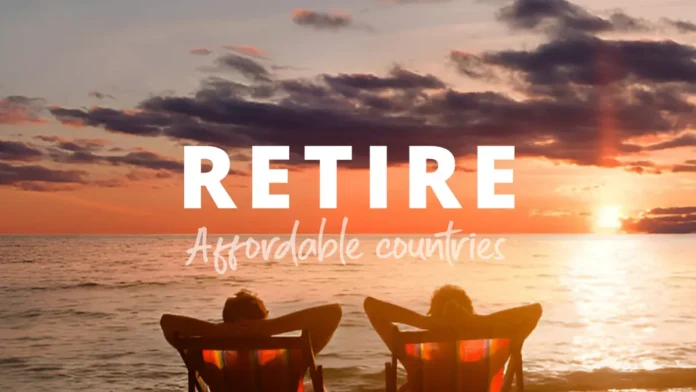In fact, this is a period of retirement that should be enjoyed sans the constant headaches associated with work. With higher costs of living in most Western economies, many retirees would want their savings stretched further by considering moving abroad.
From Southeast Asia’s beaches to the mountain tops of South America, and from the Mediterranean climate of Europe, every nook and corner is affordable, offering an out-of-the-world quality of life. Let us see some of the best countries from which one gets to retire on a shoestring budget with no compromise in lifestyle.
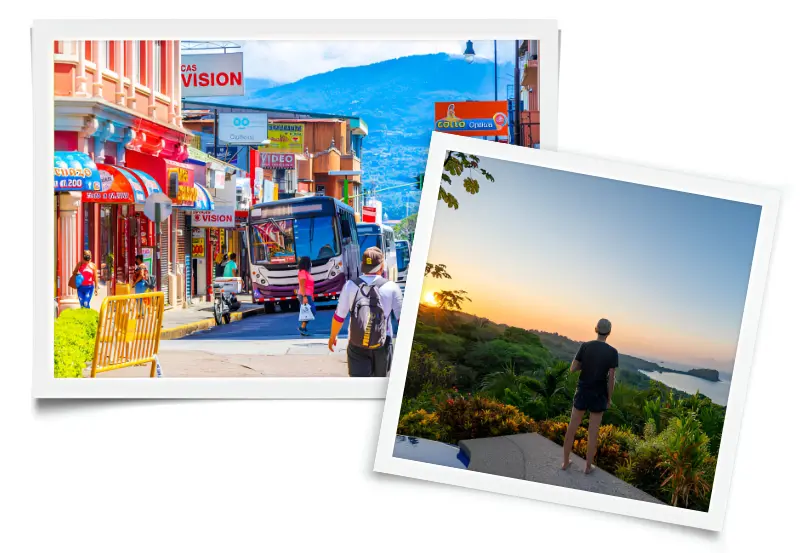
Costa Rica: A true nature lover’s paradise
Among the best places where a retiree would wish to live a quiet, inexpensive life surrounded by nature, Costa Rica is highly regarded. It is located at the heart of Central America; it is the best place that combines the tropical beauty of a country with modern infrastructure and at low costs, hence very attractive to the budget-conscious.
But probably the most popular attraction to Costa Rica has something to do with housing, and that is, ‘affordable‘. Depending on the region, one can still find houses to rent for less than US$500 a month. The best bargains are often found in areas off the main tourist path, such as Santa Teresa on the Nicoya Peninsula or regions along the Caribbean coast. This makes the property quite attractive for retirees who wish to buy a house: property prices stand as low as $50,000 in rural areas, although property in more desirable areas does cost between $100,000 and $250,000.h
Other great benefits for retirees to Costa Rica-arguably the most progressive and functionally efficient systems in Latin America for seniors-regarding healthcare: the expats have options, public healthcare, called Caja, for which the coverage is super cheap, or private, which more often than not is much cheaper than in the U.S. and the other Western countries. A consultation with a private doctor would cost an average of about $50, while health insurance in retirement starts from about US$100 per month.
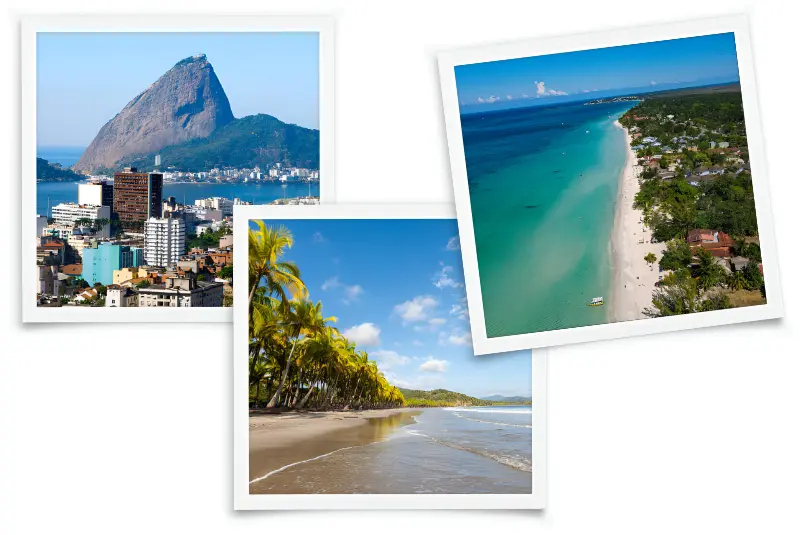
That really depends on your lifestyle in Costa Rica. Living outside major tourist areas is going to save you a lot. Places like beach towns, such as Tamarindo or Papagayo-for example-you’re likely to pay more in. Your cost of living will be a little more budget-friendly in towns such as Santa Teresa or San Jose.
Add it all up, and a very comfortable retirement in Costa Rica can be enjoyed on a $1,500 to $2,000 per month budget, including rent, utilities, food, and transportation.
Besides the financial benefits, it’s simply incomparable in terms of scenery: lush, tropical rainforests; high mountain ranges; access to both the Pacific and Caribbean coastlines-Costa Rica has it all. Costa Rica is one of the five “Blue Zones” of the world where people generally live longer and healthier. In particular, the Nicoya Peninsula is a world-renowned part of the globe for having one of the highest densities of centenarians in the world, setting quite an inspiring backdrop for retirees interested in health and longevity.
Safety is another reason that retirees would fall in love with Costa Rica; some argue it is the safest country in all of Latin America. Being a very stable democracy and having no military is one more thing that helps. The feelings of safety being reported are expats living both in the countryside and in city centers, adding to their comfort in knowing friendly locals and a growing expat community.
That means Costa Rica will have it all: shoestring budget, quality healthcare, and natural beauty. From beaches to rainforests and a rural, peaceful lifestyle, Costa Rica will surely stretch your retirement savings by offering comfort and tranquility. If a person is looking for budget retirements that really do not have zero compromise in lifestyle, then there can be no better option than Costa Rica.
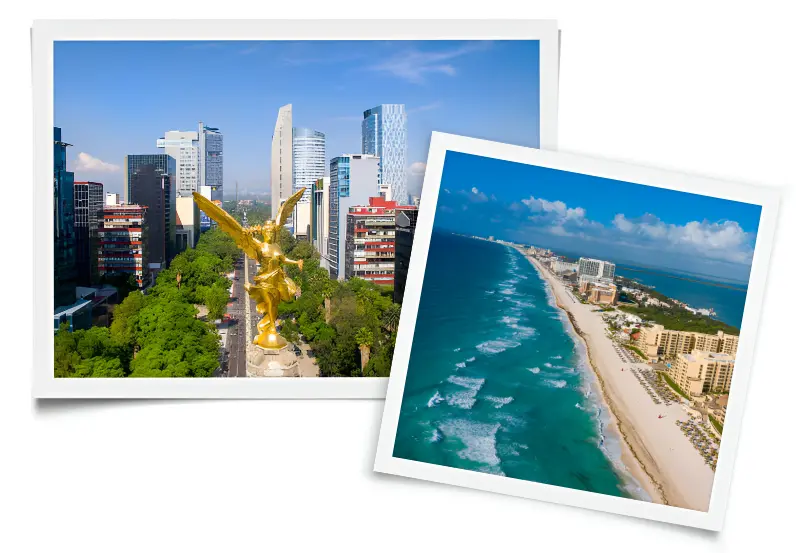
Mexico: Cultural yet affordable
Sunny climate, enriched culture, and inexpensive living have made Mexico a favorite place for retirees for quite a long time. With proximity to the U.S. and having wide ranges of landscape availability-from tropical beaches to historic cities-Mexico offers something to each retiree. Whether it be a matter of choosing between a coastal lifestyle or a vibrant city lifestyle, generally, this country allows them to spend their golden years in comfort without bothering about money. Housing in Mexico is low and amongst the most attractive features about Mexico. One can cheaply afford to rent an apartment, which costs between 400-700 dollars a month depending on your location. If one is looking to purchase property, prices vary quite a bit depending on location.
You can sometimes find apartments at beaches in the most popular coastal areas, such as Playa del Carmen or Puerto Vallarta, starting from US$150,000, while in inland cities, such as Guadalajara or Mexico City, properties start at US$100,000.
On the other hand, for those with higher budgets, luxury homes in popular cities such as Cabo San Lucas and San Miguel de Allende will start above $300,000 or higher, depending on personal budgets, offering a good number of options for retirees. Other living expenses in Mexico are also considerably more lower compared to most western countries.
Retirees can easily live well and comfortably on a monthly budget of between $1,500 and 2,500 depending on where to live and how to live. This amount of money covers rent, utilities, food and entertainment. Food eaten out in local restaurants can be as low as $ 5 or 10 per meal while the average monthly grocery bill for two persons would be around $ 300 to 400.
The other major reason retirees come to this country is for healthcare in Mexico. Mexico has both public and private health care, and all these are much cheaper compared to those in the United States. Visiting a private doctor can be roughly $30 to $50, while medical procedures are sometimes a fraction of what they would cost in the Western world. In fact, many expats chose private health insurance, generally around 100-200 US dollars per month depending on age and coverage. Mexico has a pretty good health care system. The facilities are modern, especially in the big cities, such as Mexico City, Guadalajara, and Monterrey.
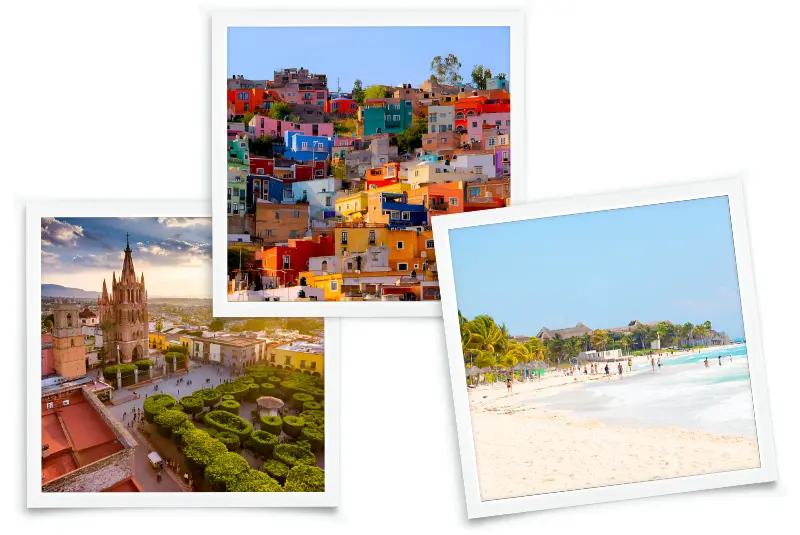
For the more outdoors-oriented retiree, there are several areas in which one can enjoy Mexico’s varied geography, from the tropical beaches on the Yucatán Peninsula in the south to the cooler, more temperate climate of the highlands. While for sun-and-sea lovers, places like Tulum or Playa del Carmen may hold a certain charm, places such as San Miguel de Allende or Guanajuato hold greater cultural appeal and even some sort of colonial charm. One of the more popular retirement destinations is the Yucatán Peninsula, with its tropical climate and very reasonable cost of living. Homes in smaller towns such as Merida may start from as little as US$70,000.
Another bonus of retiring in Mexico is its very friendly atmosphere regarding expats. Most retirees say that they feel very welcome among the locals and sometimes get pretty well-acquainted with them. Additionally, in tourist areas and bigger cities, English is pretty widely spoken, which makes things a lot easier for the English-speaking retiree. Safety varies depending on the region, so some research will be necessary prior to your decision.
In contrast, most of the expatriate communities in such towns as Puerto Vallarta and San Miguel de Allende say they feel safe and secure in their daily lives.
All in all, Mexico is retiree heaven-always affordable, infinitely varied. Such budgetary convenience would enable retirees to lead an Extra-ordinary Life with a low cost of living, advanced and quality healthcare, plus varied landscapes from which to choose. Let your taste buds yearn to be alive with urban action, historic colonial towns, or quiet beach towns; Mexico overflows with options for retirees in their search for adventure and comfort.

Philippines: Tropics retirement haven on a shoestring
The Philippines is one common choice for retirees seeking the best deal in great, affordable tropical weather and surroundings. This archipelago, with more than 7,500 islands in Southeast Asia, boasts beaches, people, and a relatively low cost of living that stretches retirement savings further than possible for most Westerners. Getting along in the Philippines is pretty easy, too, with a wide use of English and few demands on language skills.
Housing in the Philippines is comparably cheap to the Western standard. For instance, a good apartment in such places as Davao or Cebu can go from $300-500 per month, while high-end apartments in class A Manila or Makati could go up to $700 to 1,200 dollars per month. If you’re considering purchasing property, condos in major cities can be found starting at $80,000, while more luxurious properties in beach towns or suburban areas may range from $150,000 to $300,000.
The cost of living in the Philippines is rather low. A retiree can be quite comfortable on a budget of $1,000 to $1,500 a month, which can be enough for renting an apartment, paying utilities, eating out, and enjoying oneself. Generally speaking, eating out is cheap because a meal in a local eatery would cost 3 to 5 dollars, while in the more expensive parts of the country, a meal for two in a mid-range restaurant may reach only 20 dollars.
Another good advantage relating to retiring in the Philippines is the fact that one can take advantage of the Special Resident Retiree’s Visa. It is specifically made for foreign retirees, ensuring lifetime validity of a visa with multiple entries hence unlimited stay. The SRRV requires a deposit of from 10,000 to 50,000 dollars as an initial deposit depending on the age of the applicant and his retirement income. This class of visa also comes with added advantages in terms of pension tax exemptions and tax exemption on imported goods, which would be fairly financially attractive in terms of stretching one’s retirement savings.
Health care in the Philippines is inexpensive, and private hospitals in the major cities offer quality health care for a fraction of what it could cost in the West. A visit to a private doctor would cost about US$20-$40, while health insurance for retirees starts at about US$100-US$200 per month. Many expats are covered under international health insurance, making them assured of modern facilities and specialized care when that may be needed.
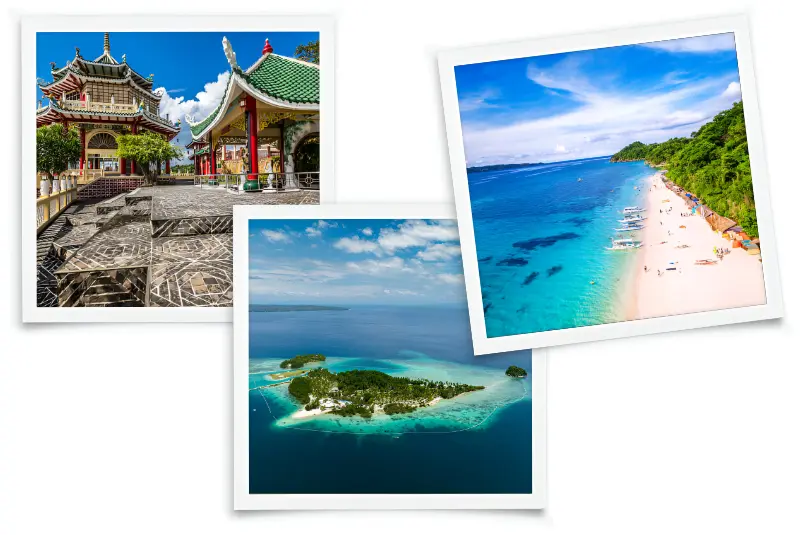
Probably the most striking feature of the Philippines is its beauty: from the crystal-clear waters with white sandy beaches of Palawan and Boracay to mountainous, very lush regions in Luzon, every nature lover can find his haven. It gets even cheaper in the countryside or places that have fewer tourists, like Davao or Iloilo, where retirees can enjoy paradise on a modest budget.
Getting around the islands isn’t exactly cheap; however, the local transportation – via buses or jeepneys – within it will cost a few cents, and there usually are domestic flights between them, which will cost less than $100.
Although the Philippines is still developing in certain ways, due to time expatriate communities have built up in cities such as Cebu, Manila, and Davao, and now it is easier to be in contact with people and retired persons. Indeed, retirees can find communities, clubs, and social groups of English-speaking people that give them a bit of their home away from home. However, retirees must remember that the Philippines are very prone to tropical storms and typhoons, hence whatever place of retirement must be selected with care. The rainy season extends between June to November, and the coastal areas, though so beautiful would be very much exposed to violent weather, while the central regions and places like Luzon are a bit more stable. Better said, the Philippines is affordability added to warmth in the avid retiree’s dream of an economic tropical haven. With a low cost of living, reasonably priced health care, and a number of breathtakingly beautiful natural landscapes, the Philippines indeed stays at the top of the list for adventure-loving tranquility seekers in retirement.

Portugal: Retirement with a Dream in Europe
Portugal is fast turning into one of the retirement destinations in Europe, promising a mix of affordability, relaxed lifestyles, and breathtaking landscapes to whoever decides to retire there. With its mild climate, beautiful coastline, and a cost of living that is cheap by European standards, Portugal is especially ideal for anyone who wants to retire on a very limited budget but still manage a good lifestyle.
Housing in Portugal is relatively inexpensive compared to Western Europe in general. You will find that smaller towns, rural areas, and one-bedroom apartments range in rentals from $500 to $700 per month. If you’re going to aim for some of the more popular cities-say, Lisbon or Porto-rentals can range upward to $900 to $1,500 per month or more, depending on location. Consequently, this would mean that, for property purchasers, housing in smaller towns or locations like Algarve starts at about US$100,000. It may start at US$200,000 to US$400,000 in Lisbon or Porto. Overall, living in Portugal will be rather inexpensive compared to the rest of Western Europe. It gives retirees the opportunity to enjoy a European lifestyle without having to pay a hefty price for it.
Living in Portugal is about as affordable. With $2,000 to $2,500 a month, a couple can get by quite easily, with their budget covering rent, utilities, groceries, and transportation adequately. Groceries aren’t expensive, either-for two persons, one week’s groceries could just be about $50 to $70. Eating out is also very cheap: a meal in a locally-based restaurant will cost about 10 to 15 dollars per person and a posh dinner only 30 to 40 dollars for two.
One of the biggest plays that Portugal has for retirees is its very well-regarded healthcare system. Public and private options exist within the country, and public healthcare is free or low in cost for residents. Many expats choose to pay for a private insurance policy in addition to the public health care, which is also quite affordable. The cost of retiree private health insurance per month will generally range from $50-$100, depending on the extent of the coverage. The private health care is of good quality, especially in big cities such as Lisbon and Porto, and much cheaper compared to the US or any other Western country. The doctor’s visit costs from about 30 to 50 dollars, and the procedures are relatively a fraction of the price compared to what it would cost in other countries.
Another reason that attracts retirees to Portugal is the Golden Visa policy, which allows non-EU citizens to apply for residence if they invest in the country-mostly in its real estate-at a value of at least €280,000 to €500,000 ($300,000 to $550,000), depending on the location. This is complemented, of course, by freedom of movement in the Schengen Area-quite the advantage for anyone planning to travel through Europe during his or her retirement period. On the other hand, Golden Visa offers the possibility to get entitlement for Portuguese citizenship after five continuous years of residence, opening up one’s path toward permanent residency and EU citizenship.

It would be the Algarve in Portugal, suiting the best balance these retirees are looking for in terms of affordability, safety, and culture. The scenic southern coastline has beautiful beaches, an extremely mild climate, and a very relaxed lifestyle. Many times, it is even much more reasonable, housing-wise, than Lisbon or Porto, and several said it’s possible to live very well on $1,500 to $2,000 a month. The Algarve is also a residence of an enormous number of expats, meaning that retirees will easily fit in and make friends.
It also ranks among the safest nations on the European continent, topping many of the safety indexes from time to time. The feeling of being safe gets even more boosted with the friendliness and welcoming nature of the locals, while for many retirees, the challenge of settling down either in a city or a small town isn’t big at all.
In addition to the practical advantages that provide real value for money, Portugal indeed provides an authentic cultural experience: historic towns, old castles, colored festivals, and all kinds of events throughout the year. The Azores and Madeira Islands also belong to Portugal and can offer retirees another style of living with their fabulous landscapes and laid-back rhythm. The mild climate-300 days of sun per year in the Algarve, for example-allows one to make use of the outdoors all year round, either by hiking or taking a tour of the various historical sites that dot the nation.
Portfolio leads the list down the line for the best option for those retirees that would wish to spend their retirement on a shoestring budget in Europe. From being affordably housed to having quality health care with low crime and easy residency options, retirees will find many ways to make their later years in this lovely country comfortable and fun-filled. From urban vibrancy to the serenity of countryside to beautiful coastlines, Portugal has something to offer any retiree.
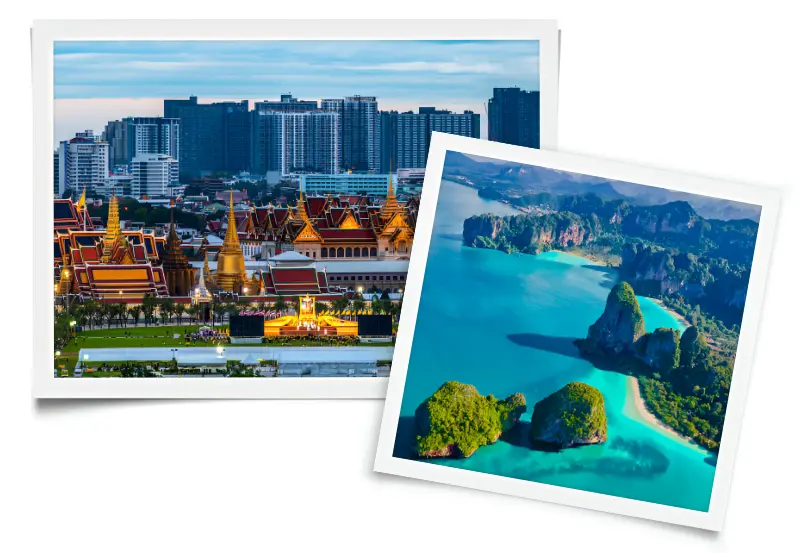
Thailand: Where to retire cheaply in tropical paradise
Arguably, Thailand has the best claim to being the prime retiring destination, as the country fuses affordability with cultural richness and natural beauty. This treasure of Southeast Asia combines high quality of life with a really affordable cost in comparison with the West. From pulsating cities to laid-back sea islands, out to the quiet countryside, options galore abound for retirees on shoestring budgets.
Probably the most attractive thing about Thailand is that it has a low cost of living. This means that a retiree can be quite comfortable with a monthly budget of $1,500 to $2,500, plus or minus, depending on location and lifestyle. Housing is particularly cheap. While a one-bedroom apartment can cost between $400 and $800 per month, depending on the location-in Bangkok or the popular resort island of Phuket-it drops in price to the low of $200 to $400 a month in small towns or rural areas. For those looking to buy, condominiums in desirable locations like Chiang Mai or Hua Hin are going to start at about $100,000, depending on how far that is from the beach or from the city center.
Besides, living expenses are pretty cheap in Thailand. One can get meals starting from 2 to 5 dollars from local restaurants, while a meal in a mid-range restaurant can go up to 10 to 15 dollars for two persons. Equally very affordable, one can get groceries at very cheap rates, and the average grocery comes to 200 to 300 dollars per month, depending on your preference of either local or imported goods. Getting around town is relatively easy and inexpensive: public bus or tuk-tuk trips run only a few dollars; and always on hand are taxis and ride shares, not to mention domestic flights for less than $50 or so to all major cities and tourist destinations.
Besides the cost of living, the other major reason retirees find Thailand attractive is its health care. Supported by a fairly adequate network of both public and private healthcare, privately-run hospitals in such cities as Bangkok, Chiang Mai, and Pattaya can offer world-class medical care much more cheaply compared to anything available in any Western country. A consultation with a private doctor will cost in the region of US$20-US$50 and many procedures can be as much as 70% cheaper than in the U.S. or Europe. Many expats take out private health insurance; this will currently cost in the range of US$60-US$200 a month, depending on your level of cover. Thailand is one of the world’s most wanted destinations for medical tourism-a fact which itself denotes the quality and reasonable price of the healthcare provided there.
Some even retire in Thailand, and for such, there is a foreigner’s retirement visa that can be granted to the 50-year-old and above, known as an O-A or O-X visa. An O-A visa requires an individual to show at least 65,000 Thai Baht – about $1,800 in proof of income per month – or a deposit of 800,000 Baht, approximately $22,000, in a Thai bank account. It can also allow retirees to stay in Thailand for one year, renewable annually. The O-X visa is also available for citizens of certain countries; it too offers a 10-year visa in return for meeting some of the same financial criteria.
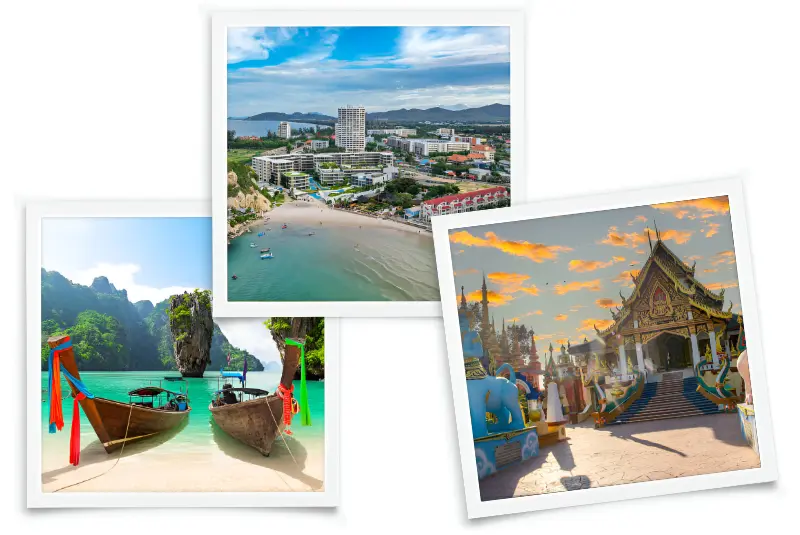
Geographically speaking, Thailand can fit the bill for any retiree. For those who love city life, there is Bangkok with all the trappings of modern convenience, cultural attractions, and a vibrant expatriate community. Chiang Mai is a northern Thai town offering a leisurely pace, a cooler climate, mountain scenery, and a significant community of retirees that is already established. If your inclination is toward island living, then Phuket, Koh Samui, and Krabi become very recognizable names that offer experiences such as beautiful beaches, water activities, and a generally laid-back lifestyle. For even more affordable living and an authentic taste of culture, rural Thailand-such as the Isaan region-meets your needs with an opportunity to fully immerse yourself in the local way of life.
Apart from its beaches, Thailand is another country that could be attractive for retirees simply for its rich culture: with more than 40,000 Buddhist temples, vibrant festivals, and a multi-century-rich history. Generally, it is in the Thai cultural heritage-from the ancient city of Ayutthaya down to colorful festivals like Songkran, which is also their New Year, and Loy Krathong or the Festival of Lights. Furthermore, Thai food is well known internationally; retirees can enjoy any type of food, from street food to gourmet meals, at considerably cheaper prices than in the West.
In a nutshell, Thailand will offer an unbeatable combination of low cost, good health care, and diverse vibrant lifestyles. Be it a low cost of living, a high-class healthcare system, or the diverse ways of life from bustling cities down to peaceful islands, Thailand is still the best destination for retirees who are looking forward to a comfortable and rounded life at an affordable budget. Whether it’s the culture, the beaches, or the cost savings, Thailand has an unbeatable quality of life for retirees.

Conclusion: Where to go in order to retire economically
This being the ideal opportunity to really make your savings go further while enjoying a higher quality of life than may be possible in these more expensive Western countries. Whether it is the beaches of Southeast Asia, the historic charm of Europe, or the vibrant culture of Latin America, the list goes on and on about which countries take retirees comfortably and affordably. With some careful planning, it’s possible to live well on $1,500 to $2,500 a month, depending on which country and what kind of life you want.
Meanwhile, retirees who live in a country like Costa Rica can access very affordable health care-private consultations will cost about $50-and comfortably live in rural areas where rent might be as low as $500 a month. Mexico has quite a number of affordable cities and quiet coastal towns where retirees can live in comfort well within the $2,000 per month budget, including housing, groceries, and health care.
Southeast Asia opens up even more cost-saving opportunities. For instance, $1,500 to $2,000 a month will keep the retiree quite comfortable in Thailand, while housing in most rural parts of the country can start from $200-$400. For as low as US$60 a month, it’s possible to get insurance in the country’s world-class healthcare system. Another country that has low living costs is the Philippines, where retirees can find housing for $300 to $500 a month and can live really well for $1,000 to $1,500 a month.
For retirees looking forward to retiring in Europe, Portugal represents an affordable life with a really rich culture. A cost of living in Portugal will range comfortably at $2,000 to $2,500 per month. In Portugal, housing can be afforded from $500 to $1,500 per month depending on the location. With a generally mild climate and beautiful landscape, Portugal will provide the best health care, with insurance premiums starting from $50 a month to $100 a month.
Wherever you want to go, you are going to have to research residency and visa possibilities for that country. Countries like Portugal have their Golden Visa, while Thailand has a retirement visa. Major ones, though, in most countries having special retirement routes, demand proof of income or savings. Others even allow residency in exchange for buying property-a proposition true for both Portugal and Mexico.
In all, the world is full of accessible retirement destinations whereby a high quality of life can be enjoyed on a modest budget. Be it the natural beauty of Costa Rica, the richness of culture in Portugal, or even the serenity of island life in Thailand, there’s something for everyone. Your preferred style of life, financial situation, and the specific visa requirements of every country will push you toward the perfect destination to spend your years without losing comfort or security.

